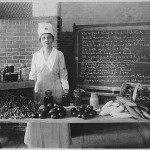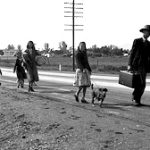The Depression brought hard times to the country, South Dakota, and the Canton Asylum for Insane Indians. The 1930s was not the only difficult period it had faced, though–the Great War (WWI) had also strained the asylum’s capabilities.
All Americans were urged to conserve food and materials, and many stirring posters reminded citizens of how vital their cooperation was to the war effort. Along with the rest of the country, the asylum supported American troops by cutting back on food so that the excess could be sent to soldiers overseas; meatless Mondays were a staple throughout the country. Superintendent Dr. Harry Hummer also initiated other measures to counter “the food situation” brought about by the war. In a letter dated July 4, 1918, Hummer reported to the commissioner of Indian Affairs that he had had to institute “one beefless, one porkless, and one meatless days” each week, along with six extra meatless meals each week. No one liked the new menu, and Hummer reported “a considerable degree of grumbling and discontent among the less patriotic of our employees.”
______________________________________________________________________________________








